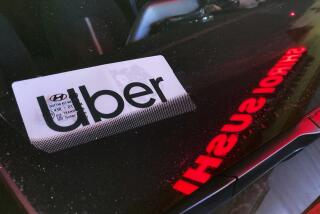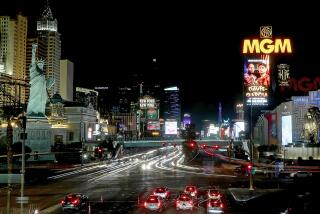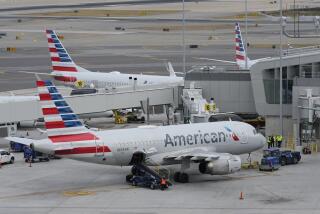Orbitz defends practice of showing Mac users pricier hotels
Mac users who search for hotels on the Orbitz online booking service are initially directed to more expensive hotels than PC users, Orbitz acknowledged last week.
Orbitz defended the practice, saying the travel search engine is simply showing users what it thinks they prefer.
Orbitz Chief Executive Barney Harford said data collected by Orbitz shows that Mac users were 40% more likely than PC users to book four- or five-star hotels.
“That is just one of many factors that determine which hotels to recommend a given customer as part of our effort to show customers the most relevant hotels possible,” Harford said in an email.
Harford’s comments came in response to a Wall Street Journal report that Orbitz produces different hotel search lists based on the type of computer used to log in.
Orbitz — among other travel websites — collects and studies millions of bits of information about people who book travel through the website. Last year alone, Orbitz processed about 750 terabytes of information about its users. A terabyte of information, if printed out, would require the amount of paper produced by about 50,000 trees.
The top few hotels shown on a search engine website are crucial because, according to Orbitz, half its customers books one of the top five hotels shown on the screen and 25% book the top property displayed.
The Wall Street Journal article generated hundreds of comments from readers, some of whom said they understood the Orbitz strategy and many of whom promised to never again use Orbitz.
“It is beyond unacceptable that a company would try to decide for me what I would want to see or where I would want to stay based solely on the type of computer I’m browsing from,” a reader posted on the newspaper website.
Delta expanding Wi-Fi service
Delta Air Lines is expanding its onboard Wi-Fi service to its long-haul international planes.
Beginning next year, Delta plans to install wireless Internet on more than 150 aircraft used for international flights. Delta, the world’s largest airline, already installed Wi-Fi on its fleet of about 500 domestic mainline planes.
When the long-haul planes are fitted with the technology by 2015, Delta will have about 1,000 planes equipped with Wi-Fi, or nearly every aircraft in the fleet with the exception of some small regional planes used for short flights.
“We have shown a consistent and steady growth in use of Wi-Fi by customers, particularly on long-haul flights,” Delta spokesman Paul Skrbec said.
The expansion is part of a $3-billion investment Delta launched in 2010 to include, among other improvements, new first- and economy-class seats on many planes and upgrades to airport lounges and terminals at Hartsfield–Jackson Atlanta International Airport, and John F. Kennedy International and LaGuardia airports in New York.
More executives take vacations seriously
In a sign that Americans may be learning to relax on vacation, a new survey found that about half of top business executives did not check in with their offices while on vacation, nearly double the rate compared with two years ago.
The survey of 1,400 chief financial officers found that 51% said they don’t call their offices while on holiday, compared with 26% in 2010, according to a report by Robert Half Management Resources, a staffing resource company in Menlo Park, Calif.
The same survey found that only 8% of executives checked into the office several times a day in 2011, compared with 18% in 2010.
The numbers suggest that more business executives are learning to leave work behind when they take time off, said Paul McDonald, a senior executive director with the staffing company.
“It may indicate that executives have a stronger level of confidence in their teams and processes, and as a result feel more comfortable skipping regular check-ins,” he said.






